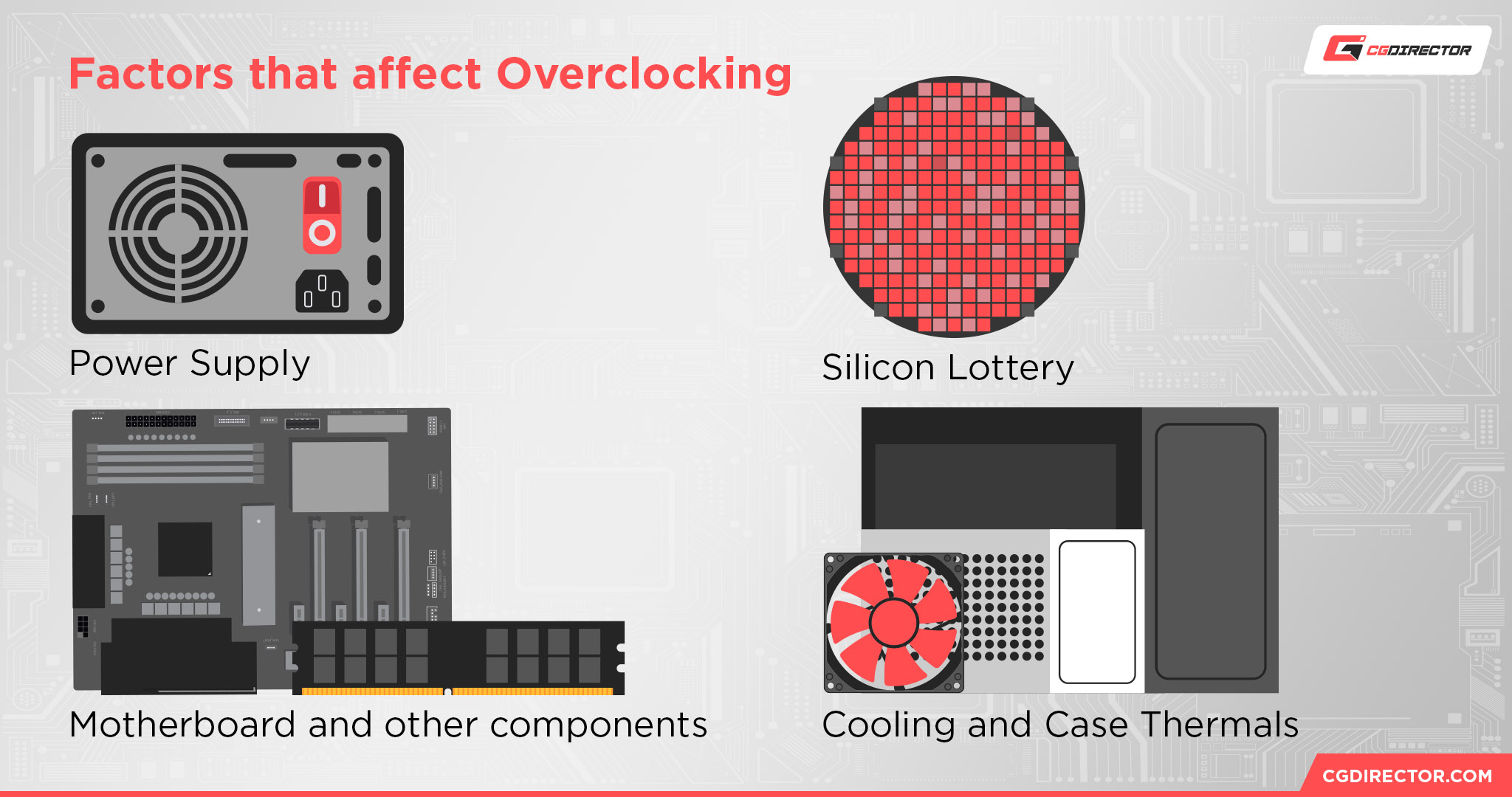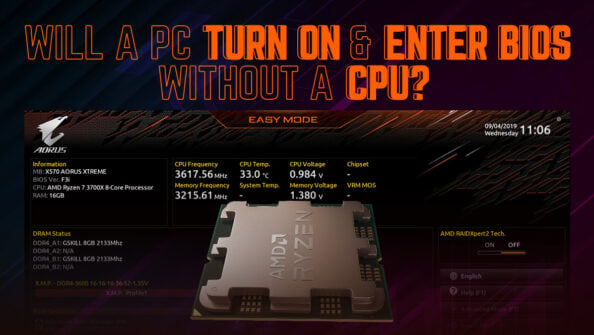Wondering what the silicon lottery is and how it impacts your CPU/GPU performance?
Today, I’ll be walking you through all you need to know about the silicon lottery, including how much of a difference it can make. I’ll also discuss whether or not it’s still worth overclocking even if you haven’t “won the lottery”, so to speak.
Let’s get into it!
TABLE OF CONTENTS
What Is The “Silicon Lottery”?
The silicon lottery is a phrase referring to the inherent unique qualities of every single CPU and GPU that is made.
![]()
Specifically, it refers to CPUs and GPUs that are “binned” for higher levels of performance than their average or below-average counterparts.
As it turns out, binning is one of the most important factors there are when it comes to CPU production specifically.
When CPUs are being manufactured, it’s known that some processors will come with minor or major defects to one or more cores within. For this reason, CPUs are binned en masse while still in the manufacturing process.
This CPU binning process during manufacturing is actually how you get most of your mid-range and low-end CPUs.
Say you’re Intel and you try to manufacture a batch of Core i9 CPUs, but a third or a half of the cores on some chips don’t work as intended.
You could waste money and resources and throw those processors away…or you could just disable the problematic cores and sell those low-binned CPUs as Core i7s or Core i5s instead (which have fewer cores anyway).
After all, the underlying per-core architecture is the same— the main difference between CPU pricing tiers has always been number of cores, not core architecture.
But of course, there’s another level to CPU binning beyond what manufacturers are doing.
In the hands of consumers and enthusiasts who can overclock CPUs, or even just with automatic boosting such as AMD’s PBO or Intel’s Turbo Boost, aftermarket “binning” reveals the true nature of the underlying “silicon lottery”, even for chips that are advertised as identical.
In the Core i9 hypothetical* discussed earlier, all the CPUs with minimal defects can still be sold as Core i9s…but they won’t all be made equal, and the true extent of these differences will emerge in overclocking.
*While this is a “hypothetical”, it is directly based on how CPU manufacturing actually works. Below, I’ve embedded a video of Intel discussing their CPU binning process:
Compared to CPU binning, GPU binning works similarly but involves more physical cutting away of silicon that doesn’t work as opposed to simply deactivating given cores.
In summation, the concept of the silicon lottery is really just an expansion on the existing binning that occurs during CPU and GPU manufacturing.
However, the silicon lottery corresponds to “high binning”, or components that perform exceptionally well for what product stack they’re in.
This is usually noted by end users, but higher-binned GPUs also tend to be saved for more expensive models by aftermarket GPU brands.
Meanwhile, most binning done in the factory corresponds to “low binning”, which is simply demoting underperforming/defective high-end CPUs/GPUs into the mid-range or entry-level so they can still be sold.
How Does The Silicon Lottery Impact CPU and GPU Performance?
The short answer is, it depends.
The long answer is…
Well, it still depends. But generally, if you aren’t overclocking, the silicon lottery aspect of things shouldn’t matter to you at all.
If you were sold an RTX 4060 or an Intel Core i5 or what-have-you, you can expect it to perform within advertised manufacturer expectations. Whatever they originally might have been in the factory, what you were sold is based on what the manufacturer could guarantee.
However, manufacturers don’t typically bin CPUs or GPUs for overclocking capabilities. In the case of higher-end GPUs that might be binned for overclocking, these are still coming from aftermarket GPU partners, not AMD or Nvidia themselves.
To determine how your CPU or GPU will perform in overclocking scenarios (and thus, where it places in the silicon lottery), all you can really do is try to overclock it yourself and compare results. Of course, the rest of your PC will need to be up to snuff too.
For CPU overclocking, which is especially sensitive, you’ll definitely want a high-end motherboard with good VRMs, regardless of how well-binned your CPU actually is.
Over time, it’s worth mentioning that CPU and GPU manufacturing processes have been improved to reduce the importance of the silicon lottery, as well as things like built-in CPU boost functionality and the such.
Because of this, if you look at a history of Silicon Lottery overclocking statistics, you’ll notice that gains from higher binned CPUs in “the lottery” become more marginal as manufacturing processes improve.
Conclusion
CPU and GPU manufacturers bin their yield to reduce waste and target different segments. Two main binning areas are employed most often:
- Chip/Core functionality: If a chip, or core complex, that consists of multiple cores is manufactured, there is a certain yield to be expected. This yield defines what percentage of these chips will be disfunctional. If this manufacturing error (silicon flaw) is limited to specific areas of the chip/core complex, then these areas can be deactivated. The, say, 16-core chip, can then be sold as a 12-core, 8-core, 6-core, etc. chip without wasting the entire chip.
- Chip/Core Quality & Performance: Because manufacturing chips is a process that isn’t just binary, meaning it doesn’t just always result in working or non-working chips, but rather in chips that have varying quality, this is where binning comes into play. You see, There’s a wide range of SKUs offered by CPU and GPU manufacturers, and the building blocks of said products (CPUs, GPUs) are mostly based on the same parts. So a Threadipper or Epyc CPU is based on the same cores as a low-level Ryzen CPU. The chips & cores themselves are just of different quality. Quality dictates stability at low power-draw (great for datacenter CPUs of the likes of Epyc and Xeon), and overclockability (great for enthusiasts, and turbo-boosting / Precision Boost Overdrive boosting). Cores that don’t boost well are sold as e.g. a Ryzen 5 CPU, chips that have great stability even at low power draw are put into an Epyc CPU.
And because there are differences even within the same SKU (not every e.g. Ryzen 9 7950X is exactly the same), when we talk about the silicon lottery, it’s the hope of consumers to receive a product that is of higher quality than the average (e.g. boosts higher on one or more cores, or can be easily overclocked, or undervolted without losing stability).
There even was a siliconlottery (.com) shop that tested CPUs a few years ago, where you could buy CPUs of higher quality at a price premium, circumventing the uncertainty of what quality the product you’re buying would encompass. Sadly this shop no longer exists.
FAQ
Does The Silicon Lottery Impact Other Components?
Nope! The silicon lottery is used solely to refer to CPUs and GPUs in the context of overclocking.
Technically there are some examples of products sold under the same name in other categories having different levels of performance, but this is usually due to underlying manufacturing processes changing than actual binning being done.
For example, DDR4 RAM kits sold with Samsung B-Dies alongside other, less performant die types.
What Happened To Silicon Lottery? (The Storefront)
The term silicon lottery has also been popularized by the storefront of the same name, called Silicon Lottery.
Silicon Lottery was all about buying existing CPUs and overclocking them to the best of their ability before selling those pre-overclocked, high-binned CPUs to their consumers for a profit.
According to Silicon Lottery, however, the gains over time became so minimal that they essentially couldn’t justify the price of continuing to run the business. So the storefront Silicon Lottery is unfortunately long dead.
Is Overclocking Based Entirely on The Silicon Lottery?
Well, yes and no.
Yes in the sense that your maximum possible overclock is determined by your place in the silicon lottery. You may get a CPU/GPU exceptionally well-suited for overclocking or you just might not.
Certain product lines may also be naturally more well-binned— for example, Intel KF CPUs with the iGPU disabled are known to be better than their basic K counterparts for overclocking.
But also, No, because there’s a lot that goes into overclocking any CPU or GPU. Your case cooling and thermals still matter.

Your Power Supply still matters. Your motherboard and its components especially matter with CPU overclocking. Having won the silicon lottery by itself does not guarantee a good overclock— the rest of your PC needs to be suitable for sustaining that overclock, too.
Over to You
And that’s all!
I hope this article helped break down what the silicon lottery is and how it impacts your end-user experience.
As time goes on, this element of randomness has fortunately been reduced over time…or maybe unfortunately, since many overclocking enthusiasts from back in the day were getting way bigger boosts than they’re getting today. Hard to say. For common consumers, it’s probably better that most of your performance isn’t locked behind an overclock, though.
What do you think? Do you have any other questions about CPU/GPU binning or overclocking in general?
Feel free to fire off in the comments section below, or take your concerns to our Discord or the Forum. In any case, me or another member of the CGD Team will be happy to help.
Until then or until next time, though, happy overclocking! May the silicon lottery smile upon you.
![“Best” PC Bottleneck Calculators [CPU/GPU]: Do they even work? “Best” PC Bottleneck Calculators [CPU/GPU]: Do they even work?](https://www.cgdirector.com/wp-content/uploads/media/2024/01/Best-PC-Bottleneck-Calculators-CPUGPU-Explained-Twitter-594x335.jpg)
![Guide to Undervolting your GPU [Step by Step] Guide to Undervolting your GPU [Step by Step]](https://www.cgdirector.com/wp-content/uploads/media/2024/04/Guide-to-Undervolting-your-GPU-Twitter-594x335.jpg)
![How to Get a CPU Cooler off of a CPU [Un-stick Glued-On Cooler] How to Get a CPU Cooler off of a CPU [Un-stick Glued-On Cooler]](https://www.cgdirector.com/wp-content/uploads/media/2024/03/How-to-get-CPU-Cooler-off-CPU-Twitter-copy-594x335.jpg)


0 Comments